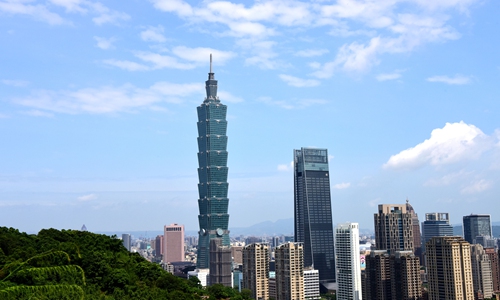HOME >> CHINA
US stirs up instability by signing ‘Taipei Act’ despite COVID-19 pandemic
By Liu Caiyu Source:Global Times Published: 2020/3/27 13:33:40 Last Updated: 2020/3/28 0:47:24

Photo:Xinhua
US President Donald Trump's signing of the "Taipei Act," which is only a piece of paper that costs nothing for the US but may fool Taiwan island, into law on Thursday amid a global fight against the COVID-19 pandemic shows that the US is only acting to serve its own interests at the expense of damaging China-US ties to provoke instability in the region and its "Taiwan card" will only be counterproductive, experts claimed.
The initiative in the cross-Straits is firmly in the hands of the Chinese mainland. Reunification of Taiwan island is the iron will of the Chinese nation. The Taiwan DPP must not have illusions on the matter, experts warned.
US President Donald Trump on Thursday signed into law the "Taiwan Allies International Protection and Enhancement Initiative Act of 2019" and the bill is aimed at propping up international presence of Taiwan island.
For Trump, it is only a performance of procedure since the act was passed by both the US Senate and House of Representatives in early March but it came at a time when all nations are busy with the fight against the COVID-19 pandemic, which reflects the US is only acting to serve its own interests by stirring up trouble in the Asia-Pacific region instead of focusing on its own fight against the pandemic when the US is now No.1 in confirmed coronavirus cases, experts noted.
Playing the Taiwan card is on the must-to-do list for Trump to secure ballot tickets for the upcoming 2020 president election, as for the global fight against the pandemic, Trump has been treating it with contempt, Song Zhongping, a Chinese military expert and TV commentator, told the Global Times on Friday.
It is such an unethical act. No matter how much China provides to US aid in its fight against the epidemic, the US will not stop its efforts to harm China's interests. If the US continues to do so, China's future assistance to it might be affected, said Li Haidong, a professor at the Institute of International Relations of China Foreign Affairs University.
The Taipei Act authorizes the US State Department to reduce, expand or terminate economic and diplomatic engagements with nations that take actions to undermine Taiwan. Under the act, the US government will help Taiwan island gain participation in international organizations, either as a member or an observer, and provide weapons to the islands.
The act aims at interfering in other countries' internal affairs through US' diplomatic system, and the US may come up with policies to reduce economic support to nations that undermine Taiwan island, but these nations will surely put their national interests first rather than following directions of the US, experts said.
At the very least, how much international space does the Taiwan administration have when there are only 15 remaining small "diplomatic allies" who may not cut ties with the island in fear of Washington's intimidation? Ultimately, the bill will only offer some psychological comfort to the DPP authority, analysts noted.
After Tsai Ing-wen took office, she refused to recognize the "1992 Consensus," which caused the international space of Taiwan island to shrink sharply, and lost seven nations that had "diplomatic relations" with it.
Li Xiaobing, an expert on Taiwan affairs at Nankai University in Tianjin, told the Global Times that America's empty promise of "support for Taiwan" is cliché, and its attempts to play the Taiwan card is plain to see.
This is not the first time that the US has passed Taiwan-related enabling acts in recent years, examples include the Taiwan Travel Act in 2018 and the Taiwan Assurance Act of 2019.
By adopting such act, the US attempts to interfere in the internal affairs of China, and sends out the wrong signal to Taiwan island that they are backed by the US. But the act is only a dirty business between Taiwan separatists and pro-Taiwan US politicians who serve the interests of the US at the expense of peace and stability in the Western Pacific, experts noted.
The foreign affairs committee of the National People's Congress expressed strong dissatisfaction and firm opposition to the US signing the act into law on Friday, urging the US to be aware of the high sensitivity of the Taiwan question and not implement the bill.
In a statement released late Friday, the NPC said the bill ignores the one-China principle, which is the general consensus of the international community, and the fact that the US established diplomatic relations with China 41 years ago. It unreasonably obstructs other countries from establishing diplomatic ties with the Chinese mainland and aims to help Taiwan expand so-called "international space," the NPC said.
The signing of the Taipei Act violates the one-China principle and important consensus that the leaders of the two countries have achieved, which will seriously obstruct cooperation of the two nations and ultimately harm the interests of the US, the NPC wrote in the statement.
The Chinese Foreign Ministry also expressed firm opposition to the bill on Friday, saying it is an act that wantonly interferes in China's internal affairs.
Geng Shuang, a Chinese Foreign Ministry spokesperson, said the bill seriously violates the one-China principle, provisions of the three joint communiques between the two nations, and seriously violates international law and the basic norms of international relations.
180 countries have established diplomatic relations with China. The US established diplomatic ties with China on the basis of the one-China principle more than 40 years ago. However, the bill blatantly obstructs other sovereign states from developing normal relations with China, which doesn't make sense and it is a naked hegemonic logic, Geng said.
We urge the US to correct its mistakes, not to implement the law, and not to obstruct other nations from developing ties with China. Otherwise, China will firmly fight back, Geng said.
Posted in: DIPLOMACY